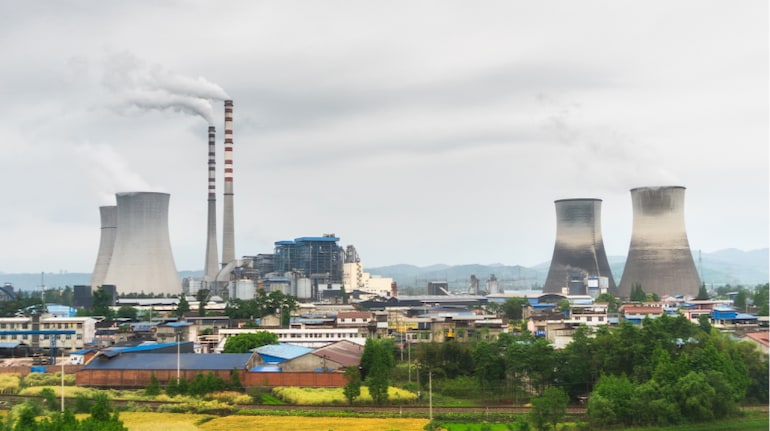



The Centre has re-imposed the emergency clause of the Electricity Act, 2003, asking all imported coal-based (ICB) power plants in India to operate and generate power at their full capacity in the ensuing summer months. The government has taken this decision as the peak power demand is expected to touch 229 gigawatt (GW) in April, according to an order issued by the ministry of power late on February 20.
“To ensure availability of electricity to meet the anticipated demand, the generation from ICB plants needs to be increased. Accordingly, in larger public interest, for ensuring optimum generation from ICB plants, directions are issued under Section-11 of the Electricity Act, 2003 that all ICB power plants shall operate and generate power to their full capacity. Where the imported coal based plant is under NCLT (National Company Law Tribunal) the resolution professional shall take steps to make it functional,” read the order issued by the power ministry. Moneycontrol has a copy of the order.
On January 9, 2023, Moneycontrol first reported that the previous such order under Section 11 of the Electricity Act lapsed on December 31, 2022, after being extended from October 31, 2022. In that report, Power Minister RK Singh’s office had exclusively told Moneycontrol that the emergency clause would be re-invoked whenever the need arises again.
On May 5 last year, when the country’s power demand had suddenly soared and thermal power plants had inadequate domestic coal to run fully, the power ministry invoked an emergency clause of the Electricity Act (section 11) and asked all thermal power plants running on imported coal to open and generate at their full capacity. At that time, most of these imported coal-based thermal power plants were shut due to high International coal prices and also because their power purchase agreements (PPAs) did not have adequate provisions for pass-through of the increased cost of generation. But, after the order, they had to mandatorily restart operations.
On January 3 this year, the Central Electricity Regulatory Commission (CERC) ordered that plants running on imported coal should be compensated for supplying electricity under emergency circumstances. The order though was issued in response to a petition filed by Tata Power Company Limited (TPCL).
Following the CERC’s order, the power ministry in its February 20 order also mentioned the pass-through aspect for such ICBs. “Considering the fact that the present power purchase agreements (PPAs) do not have adequate provision for pass through of the present high cost of imported coal, the rates at which the power shall be supplied to PPA holders shall be worked out by a Committee, constituted by the Ministry of Power (MoP), with representatives from MoP, Central Electricity Authority (CEA) and NTPC. This Committee shall ensure that the benchmark rate of power so worked out meets all the prudent costs of using imported coal for generating power, including the present coal price, shipping costs and operational and maintenance (O&M) costs etc. and a fair margin,” it stated.
“The fixed charge will be as per the PPAs, or as has already been agreed mutually between the generating company and the procurers. The PPA holder shall have an option to make payment to the generating company according to the benchmark rate worked out by the Committee or at a rate mutually negotiated with the generating company. These plants will supply power in the first instance to the PPA holders. Any surplus power left thereafter or any power for which there is no PPA will be sold in the power exchanges,” read the order.
The latest order would mean at least 15 ICBs will have to operate at their full capacity until further notice. Some of these include Coastal Gujarat Power Ltd, Adani Power Mundra Ltd, Essar Power Gujarat Ltd, JSW Ratnagiri Ltd., Tata Trombay Ltd., GSECL Sikka Ltd., IL&FS Tamilnadu Power Company Ltd, Muthiara-Coastal Energen, Udupi Power and so on.
“During the current year 2022-23, India met its all-time high electricity demand of about 215 GW. It has been forecasted that the peak demand will reach up to 229 GW during April 2023. To meet this demand, about 193 GW generation would be required from thermal generating stations. In the likely scenario of a gap in the demand and supply of domestic coal and essential requirement of maintaining coal stock at generating stations, the use of imported coal needs to be increased by way of blending with domestic coal in domestic coal-based plants and also by ensuring optimum generation from imported coal-based (ICB) plants. This will ease the pressure on domestic coal supply and also ensure that all the plants are available during the peak demand period,” read the ministry’s February 20 order.
Discover the latest Business News, Sensex, and Nifty updates. Obtain Personal Finance insights, tax queries, and expert opinions on Moneycontrol or download the Moneycontrol App to stay updated!
Find the best of Al News in one place, specially curated for you every weekend.
Stay on top of the latest tech trends and biggest startup news.